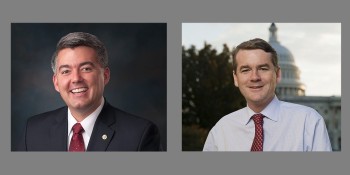|
DENVER — It’s no secret that in the 2017 legislative session, legislators would face a tough budget year that would include painful cuts, despite Colorado having one of the strongest and most prosperous economies in the entire country. While the Joint Budget Committee (JBC) has worked hard for months to present a balanced budget, this year’s budget came before the State Senate with $264 million in cuts to hospitals, the negative factor for K-12 education funding rising to $880 million dollars, and a lack of funding for important items like the Healthy Kids Survey, affordable housing, and support for the state healthcare exchange.
The hospital cuts are particularly painful, as much has been written about how cuts to hospitals would really hurt rural communities, children of working families, and seniors. With the $264 million cut to the Hospital Provider Fee in this budget, which would result in over $500 million being lost for hospitals across the state, the need to move the Hospital Provider Fee into an enterprise fund is more profound than ever before.
“Year after year, we come to this Capitol, and we are tasked with our constitutional duty to pass a balanced budget. While this budget we passed out of the Senate reflects some of the values we hold dear as Coloradans, the deep cuts into our hospitals that are included cannot be forgotten. However, I believe the budget is a living document in that it is not finished. It is my strong hope that with the work from our House colleagues, and the bipartisan legislation I am bringing with my Senate Republican colleagues to move the Hospital Provider Fee into an enterprise fund, we will adjourn this session with a budget that is much closer to reflecting the values of Colorado,” said Minority Leader Lucia Guzman, D-Denver.
Presented with the FY2017-2018 state budget, Senate Democrats took the lead and brought a number of amendments with the goal of making tough budget better for the people of Colorado. While some of these commonsense amendments passed and improved the budget, others were voted down on a primarily party-line vote by Senate Republicans.
What Passed:
Supporting Connect for Health Colorado:
State Senator Leroy Garcia, D-Pueblo, carried an amendment that enabled Connect for Health Colorado to receive the supportive funding needed for activities related to determining eligibility for Medicaid and the Children’s Basic Health Plan.
“Colorado has emerged as a leader in healthcare, having cut our uninsured population in half and seeing more of our most vulnerable population gain access to life-saving healthcare. There certainly have to be improvements to address cost drivers, but given the signals from the new Administration to end Medicaid expansion, it falls to the state of Colorado to ensure we’re taking care of our own. The people have sent a loud and clear message — they don’t want to lose their healthcare. I am proud of my Democratic colleagues for leading on this amendment, and I thank my colleagues of the entire Senate for standing up for healthcare and passing this amendment,” said Senator Garcia.
The Healthy Kids Survey:
An anonymous, voluntary survey that is administered to K-12 students, the Healthy Kids Survey is utilized to gain a better understanding of the challenges Colorado kids are facing in schools, identify trends, and enhance school, community, and state-based programs designed to improve the well-being of those kids. Funding for the Healthy Kids Survey was originally stripped on a party-line JBC vote, but thanks to State Senator Cheri Jahn, D-Wheat Ridge, the amendment garnered enough bipartisan support to add funding for the survey back in.
“Without the vital data gained through the Health Kids Survey, we’re flying blind. We already know kids in Colorado face a number of challenges in school, from the temptation of drug use, to bullying, to suicidal thoughts. But it is thanks to this data that we have an idea of what these kids are facing, and how we can best support them. We should be seeking every avenue to ensure Colorado kids are set up for success, and I am very pleased funding for this important survey was added back in. I thank my colleagues, and my co-sponsor Senator Coram, for making this possible,” said Senator Jahn.
Voting Against Pay Raises for Politicians:
In a budget seeing schools continue to be underfunded and support for hospitals being cut, the last thing Colorado’s lawmakers should be doing is giving a pay increase to themselves. State Senators Kerry Donovan, D-Vail, and Rachel Zenzinger, D-Arvada passed an amendment so politicians wouldn’t be seeing an increase in pay when other Coloradans are seeing funding for services being cut.
“Rural communities, including those in my district, are bearing the brunt of what was cut to balance our budget, and the last thing politicians should be doing is voting themselves a pay raise. I’m glad to have worked with the entire Senate in order to ensure we stuck to a promise of fiscal responsibility,” said Senator Donovan.
“I don’t see how any of us could have gone back to our districts, look our constituents in the eye, and say, ‘Well we couldn’t fully fund schools or save hospital funding, but at least we gave ourselves a pay raise!’ Hardworking Coloradans across my district, and across the state, are tightening their belts, and we should be doing the same. That is why I was proud to carry this amendment to ensure politicians would not be lining their pockets in a tough budget year,” said Senator Zenzinger.
Affordable Housing:
Last November, Governor Hickenlooper included in his proposed budget a recommendation of $16.3 million to provide housing and treatment for persons who are chronically homeless. The targeted populations includes veterans, youth and adults being released from incarceration, and clients being discharged from the State Hospital – individuals experiencing mental health and substance use disorders. The dollars were to come from the Marijuana Tax Cash Fund to create housing with supportive services that address behavioral health issues, and this recommendation was not approved by the JBC earlier in the year. Thanks to State Senator John Kefalas, D-Fort Collins, the sponsor of an amendment to the Long Bill, the $16.3 million appropriation was included in the state budget with bipartisan support.
“Just stepping outside the State Capitol, you can see people all around us who are experiencing chronic homelessness. There is a cross section of people who are impacted by behavioral health issues and at greater risk of being out on the streets. This public investment of resources for supportive housing will help veterans, youth and adults get their lives back in order as they seek to integrate back into civil society. Permanent supportive housing is a successful model for addressing chronic homelessness, and this is a wise investment in people’s lives. I am grateful to the Governor and for the many groups that supported this budget amendment from law enforcement, veterans, municipal housing and behavioral health sectors. I am glad that we are refocusing on affordable housing and treatment in the state budget as this approach is humane and will save the taxpayer money in the long run,” said Senator Kefalas.
Additional Funding to Support our Veterans:
While steps have been taken in recent years to address the barriers preventing Colorado’s veterans from accessing critical services and care, more can always be done. A Marine and an Iraq War veteran, Senator Garcia carried an amendment to allocate $300,000 in additional funding for counties to provide services like educational training, job placement, housing, and healthcare.
“Making sure our veterans are properly being informed and connected with vital services they have earned should absolutely be at the top of our priorities in Colorado. For veterans who are dealing with health issues, timing is of the essence, and anything we can do to improve response times and increase access to veteran services is a good thing for the Colorado state budget. I am very pleased my Democratic colleagues took the lead on making sure our veterans are taken care of in this budget, and I am very pleased this important amendment was added,” said Senator Garcia.
Respecting the Will of the Voters:
Regardless of how you feel about the issue, the majority of Colorado voters said “Yes” to adding end-of-life options to our statutes last fall. Funding record keeping for this option in the 2017 budget is a matter of respecting the will of the voters. While ideologues had voted to strip funding for this measure in the budget, State Senators Lois Court, D-Denver, and Mike Merrifield, D-Colorado Springs, carried a successful amendment to put this funding back into the budget.
“65% of the people of Colorado — our constituents — voted ‘Yes’ to put end-of-life options into statute. To me, it does not matter how you personally feel about the issue. If your constituents voted for this, you should respect their will and ensure the record keeping is carried out. I was outraged when the funding was initially stripped for purely ideological reasons, but I come away pleased the funding is back where it rightly should be,” said Senator Court.
“With this amendment, the budget got a little closer to truly reflecting the values of Colorado. The people decided they want end-of-life options, and to not fund end-of-life options record keeping was an affront to the people of Colorado. I am just pleased enough of my colleagues on the other side of the aisle came to their senses, and voted with Democrats to put this funding back in, as specified in the proposition,” said Senator Merrifield.
More Funding for Ambulances and Health Transportation:
Whether it is in our greatest hour of need in an emergency, or transporting some of our most vulnerable Coloradans to a non-emergency appointment, medical transport is one of the most vital services Colorado can provide. The amendment carried by Senator Zenzinger adds additional funding for transportation for the elderly and Coloradans with disabilities to get to non-emergency appointments, and for ambulances.
“Access to medical transport can be the difference between life and death, and can help determine if independent living is a possibility. With access to healthcare being a serious concern of my constituents, and of hard-working people across Colorado, this amendment will be helpful in providing critical access to care not only when Coloradans with disabilities and seniors are facing an emergency, but also provide access to a routine check-up so they can take care of their health. I am very pleased this priority made it into this budget,”said Senator Zenzinger.
What Didn’t Pass:
Supporting Rural Small Businesses
A recent study show that Colorado has the top economy in the entire nation. Much of that can be attributed to Colorado’s business-friendly climate that attracts innovative entrepreneurs and successful start-up small businesses. Small businesses are the engine and backbone of our economy. Yet, Main Street businesses outside the Denver-metro area have been left behind. State Senator Angela Williams, D-Denver, proposed a modest amendment to invest in small businesses in rural Colorado, which unfortunately died on near party-lines.
“With Democrats leading at every level of government, Colorado has grown and grown into one of the most business-friendly states in the entire union. That’s because supporting small businesses has been and always will be a Democratic principle. This amendment would have continued that tradition by supporting small businesses in our rural areas, so that Main Street outside the Denver-metro area has more resources to thrive, and I am very disappointed my Republican colleagues chose to vote no,” said Senator Williams.
Increased Access to Contraception
State health officials estimate that contraception have saved at least $79 million in Medicaid costs for unintended births. It is a small investment with a significant return that reduces reliance on government programs. If a young woman is in a situation where she has to choose between having a child and earning a higher education, she should have the resources necessary to have a fair-shot at getting and staying ahead. State Senator Rhonda Fields, D-Aurora, carried an amendment to increase access to contraception for more of Colorado’s women. What ensued were Senate Republicans disputing “scientific evidence” of women’s healthcare, and calling birth control “abortifacients”.
“If a young woman is in a situation where she has to choose between having a child and earning a higher education, she should have the resources necessary to have a fair-shot at getting and staying ahead. What we heard from Senate Republicans was an insult to Colorado women, and I am very disappointed they chose to not only vote no, but insinuate access to contraception is some kind of controversy when it is not,” said Senator Fields.
Bringing Down the Negative Factor
Colorado has one of the most robust economies in the entire country, and yet, year after year, the state continues to lag near the bottom in funding our classrooms. While some in the Majority declared this budget a victory for K-12 kids, the negative factor has grown by $50 million in this budget. Colorado is getting awfully close to underfunding our kids by nearly $1 billion, so State Senator Nancy Todd, D-Aurora, brought an amendment to prevent that $50 million increase. The amendment was voted down on a near party-line vote.
“This budget isn’t a win for our K-12 schools, despite what the Majority claims. The negative factor is slowly creeping towards $1 billion, and yet Colorado continues to kick the can down the road. Colorado has one of the strongest economies in the nation, yet Colorado consistently ranks near the bottom in funding our classrooms. Colorado’s kids deserve better for their future, and it saddens me that Senate Republicans think they’re getting enough,” said Senator Todd.
Holding Big Corporations Accountable
Whether it is out in Boulder County, or frankly anywhere in the state, big oil and gas corporations have conducted their business without nearly enough accountability to the people of Colorado. Whether it is a lack of resources to inspect air pollution, or companies using forced pooling to line their own pockets by extracting through people’s property, there simply isn’t enough accountability. State Senator Matt Jones, D-Louisville, sought to rectify this by introducing an amendment to add 11 new air pollution inspectors, and an amendment to add an inspector to track the number of properties that are forced pooled. Both died along near party-lines.
“It is really a shame the state government continues to stand by and not hold oil and gas corporations accountable for not only the damage they are doing to our air and environment, but for how they basically ‘condemn’ people’s property in the practice of forced pooling in order to increase their bottom line. More accountability and oversight over these bad actors are needed, and we had an opportunity put a modest amount of funds towards protecting our future. These amendments being voted down were a loss for the people of Colorado, and a win for the oil and gas industry,” said Senator Jones.
Protecting Colorado from Wildfires
As Coloradans are well aware, when Colorado enters summer, the threat of wildfires becomes even greater. From the Eastern Plains to Jefferson County, the threat of wildfires looms as county fire departments and volunteer firefighters can find themselves overwhelmed by the ferocity of these fires. To support these brave first responders, and to bolster the protection of Colorado homes and lands, State Senator Steve Fenberg, D-Boulder, proposed an amendment to increase funding for the wildlife emergency response fund and wildfire mitigation. Rather than entertain supporting first responders, Senate Republicans unanimously voted down the amendment.
“The protection of all our communities from these dangerous wildfires should always be a top priority. Rather than leaving these communities to fend for themselves, I believe we would have been well-served by bolstering funding for wildfire response and mitigation. It is a shame Senate Republicans, even those whose districts and constituents have experienced wildfires, chose not to add this to the budget,” said Senator Fenberg.
Bolstering Funding for Meals on Wheels
As we’re seeing from the new Administration, their budget proposes cutting into a program that is currently serving 1.2 million seniors. Many Coloradans can attest that seniors not only utilize this program to receive hot meals, but that the program supports independent living as well. If our budget is a reflection of our values, then increased funding to make sure seniors have access to this critical program should have been part of the budget. Unfortunately, the amendment carried by Senator Fields was voted down on a near party-line vote.
“We kept hearing ‘budgets are tough’. Well, the budgets of the people in my district are tough too. With our federal government siding by the side of neglect for our senior population, Colorado needs to take charge to support our seniors in providing them a relatively low budgeted program to alleviate their budget insecurities. I am frustrated that our Republican Senators have decided to be on the wrong side of history and ignore the bare minimum needs of our senior population,” said Senator Fields.
Making College More Affordable
While going to college isn’t for everyone, attending a college or university for higher education is still a highly sought-after goal that many Colorado kids see as an opportunity to reach their potential. For many however, a college degree is becoming too expensive to afford. As a result, many of those who are able to attend end up graduating with student debt. Senator Zenzinger offered an amendment focused on tuition increases that unfortunately died on near party-lines.
“Any child in Colorado who wants to go to college should be able to have that opportunity. Yet, the dream of a college education continues to become more and more out of reach, especially for our hardest-working families. This amendment was about making higher education more attainable for Colorado’s children, and it is extraordinarily disappointing Senate Republicans said no to that simple, yet important principle,” said Senator Zenzinger.
Investing in Renewable Energy
Over the past decade, Colorado has grown into a leader in the new energy economy. As renewable energy has proven to be cleaner, cheaper, and more cost-effective for businesses, economic opportunities have continued to grow for hard-working Coloradans. To ensure Colorado continues to go its own way in renewable energy, State Senator Andy Kerr, D-Lakewood, carried two amendments; an amendment to fund the National Renewable Energy Lab, and an amendment to fund a study on wind energy at the Colorado School of Mines. Both died on a party-line vote.
“The people of Colorado are very well-aware of how beneficial renewable energy like wind and solar have been to our economy, and to protecting our natural environment as well. Given the fact over 62,000 Coloradans are employed in clean energy jobs alone, it would stand to reason we work to make sure these opportunities only continue to grow, which is what these amendments were designed to do. Colorado’s U.S. Senator Cory Gardner earlier this week highlighted the importance of the National Renewable Energy Lab for grid modernization and efficiency, I am disappointed my Republican colleagues did not feel the same way,” said Senator Kerr.
Wiring Colorado from Corner to Corner
Much has been talked about in this building about wiring every corner of Colorado with reliable, high speed broadband. Yet it seems, year after year, politics rule the day as good bills to bring broadband to rural Colorado are voted down in committee, such as Senator Donovan’s two rural broadband bills this year. During the budget debate, Senator Donovan introduced an amendment that didn’t pass to place funding into the Rural Broadband Support Fund.
“Access to broadband is a matter of fairness. We talk all the time about wiring Colorado, but the General Assembly never follows through on its promise. I am very disappointed my colleagues didn’t seize this opportunity to ensure rural Colorado has the same opportunities to access the new economy as people do in other parts of the state. This amendment would have sent a message the state believes in my district,” said Senator Donovan.
Backing Big Bird
We know the new Administration in Washington, D.C. is likely going to make cuts to the National Endowment for the Arts, which affects the survival of important educational programming and art programs that are part of the fabric of America. Studies have shown that the educational program that is funded through the Endowment like Sesame Street can have profound positive impacts on kids education. To prevent our kids from losing out on Big Bird and his friends, Senator Merrifield introduced an amendment to bolster funding for the National Endowment for the Arts. The amendment was voted down on a near party-line vote.
“Even going back to Mitt Romney in 2012, it seems the Republican Party hates Big Bird. We know the new Administration in Washington, D.C. is likely going to make cuts that affect the survival of important educational programming and art programs that are part of the fabric of America. I want to live in a country where my grandkids, my great grandkids, and every kid across the country has access to free programming that has been shown to have a positive impact on their education. Too bad my Republican colleagues don’t feel the same about Sesame Street,” said Senator Merrifield.
Full-Day Kindergarten for all Colorado Kids
Kindergarten is the first stage in primary education. Studies have shown students who went through full-day kindergarten are more likely to succeed later in life. Senator Kerr brought an amendment that would fund full-day kindergarten for all Colorado kids, not just those fortunate enough to have families who can afford it. The amendment died on a mostly party-line vote.
“It’s fairly simple — do we want to invest in the future of all children or not? In a year where we’re seeing the negative factor go up by $50 million, we need to be doing more for Colorado kids’ education. Studies across the board have shown that students who go through full-day kindergarten are better prepared to succeed, and yet only students lucky enough to live in districts that fund full-day kindergarten are guaranteed this leg up. It’s a shame my Republican colleagues just don’t agree all kids should have the same opportunities to succeed in school,” said Senator Kerr.
Senate Bill 17-256, also known as the “Long Bill”, passed out of the Senate on a 30-5 vote. It will now be considered by the House.
|






